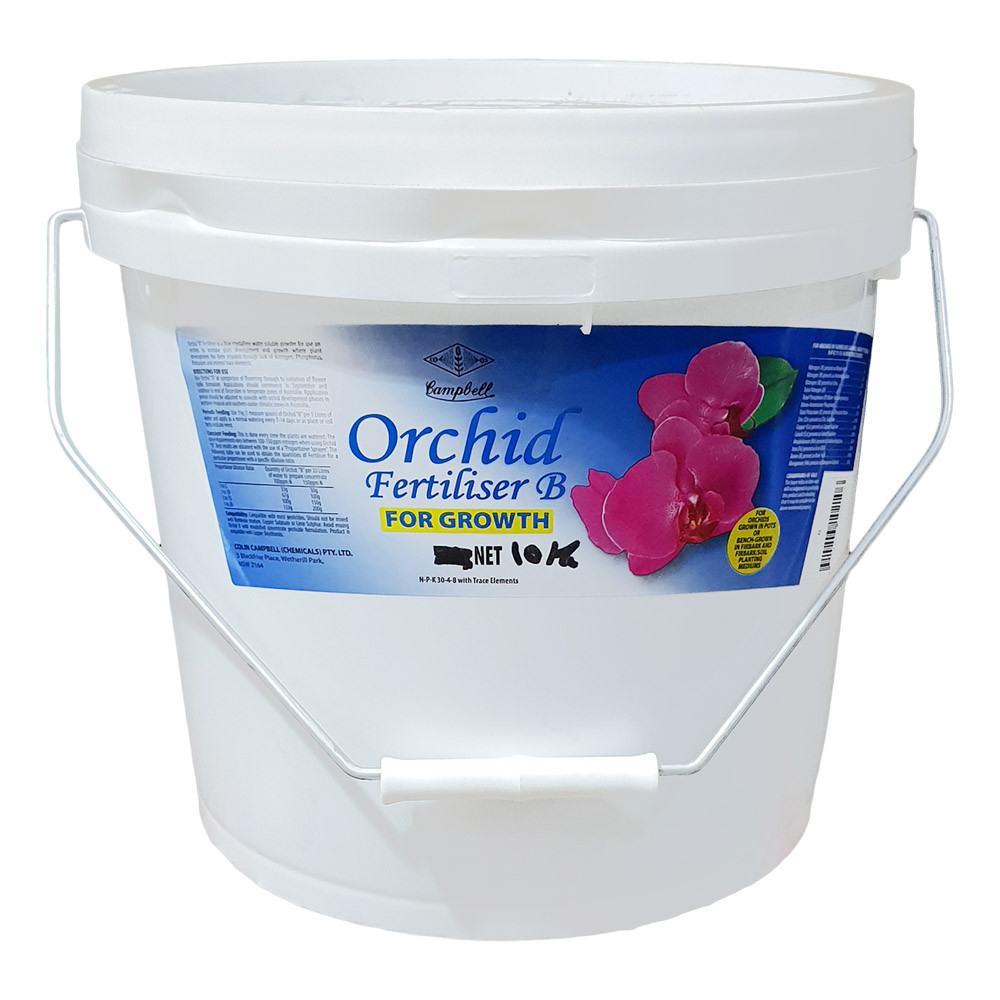Description
THIS PRODUCT: Introducing Campbell Orchid Special Fertiliser “B” (Blue Powder): A water-soluble fertiliser expertly crafted for Orchids to boost growth and maintain plant vigour.
Campbell Orchid Special Fertilisers “A” & “B” are premium, crystalline water-soluble powders that provide the ideal balance of Nitrogen (N), Phosphorus (P), and Potassium (K) to your Orchids, along with essential trace elements such as Zinc, Copper, Molybdenum, Manganese, Iron, Boron, and Magnesium. There’s no need for additional trace element supplements, as they are already integrated into Campbell Orchid Fertilisers.
For optimal results with Fertiliser “B”, start applying after the completion of flowering and continue until the initiation of spike formation. In temperature zones in Australia, begin applications in September and continue through to the end of December. The high Nitrogen (30%) content in Fertiliser “B” stimulates plant growth and enhances plant vigour during the senescence period.
Application Rate: 15g per 5L water every 7-14 days (1 measure spoon) Analysis: 30–4–8 + Trace Elements
In General: Orchid fertilizer is a specialized type of plant food formulated to meet the unique nutritional needs of orchid plants, which can be quite different from those of other houseplants or garden plants. Orchids are sensitive to over-fertilization, so using the right type and amount of fertilizer is crucial for their health and blooming. Here is a description of orchid fertilizer and its uses:
Description: Orchid fertilizer is typically available in liquid or granular form, and it is designed to provide essential nutrients that orchids require for healthy growth and vibrant flowering. These nutrients are often labeled with their N-P-K ratio, which indicates the concentration of three key elements:
- Nitrogen (N): Nitrogen is essential for promoting leafy green growth in plants. Orchids need a balanced amount of nitrogen to produce strong and healthy leaves and pseudobulbs.
- Phosphorus (P): Phosphorus is crucial for root development and flower production. Orchid fertilizers usually have a higher phosphorus content to encourage blooming.
- Potassium (K): Potassium helps with overall plant health, root development, and disease resistance. It also plays a role in flower color and longevity.
In addition to these primary macronutrients, orchid fertilizers may contain micronutrients like calcium, magnesium, and trace minerals to ensure well-rounded nutrition for your orchids.
Uses:
- Promoting Growth: Orchid fertilizer helps orchids develop strong, healthy foliage. Nitrogen-rich fertilizers can encourage robust leaf and stem growth, which is particularly important for orchids that primarily grow leaves and pseudobulbs.
- Enhancing Blooming: Orchids are prized for their stunning flowers. Fertilizers with higher phosphorus content can stimulate blooming and contribute to more abundant and long-lasting flowers. It’s often recommended to switch to a “bloom formula” fertilizer when you want to encourage flower production.
- Establishing Healthy Roots: Phosphorus and potassium in orchid fertilizers support root development, which is crucial for overall plant health. Healthy roots help orchids take up nutrients and water more effectively.
- Balanced Nutrition: Orchid fertilizers are formulated to provide a balanced combination of nutrients, ensuring that your orchids receive all the necessary elements for proper growth and development.
- Preventing Deficiencies: Regularly using orchid fertilizer can help prevent nutrient deficiencies, which can lead to stunted growth, yellowing leaves, and poor flowering.
- Avoiding Over-Fertilization: Orchids are sensitive to over-fertilization, which can lead to salt buildup in the potting medium. It’s important to follow the manufacturer’s instructions and not exceed the recommended dosage.
Overall: Orchid fertilizers come in various formulations, so it’s essential to choose one that matches your specific orchid type and its growth stage (e.g., vegetative growth or blooming). Regular, balanced feeding, along with proper watering and light conditions, is key to keeping your orchids healthy and thriving.


